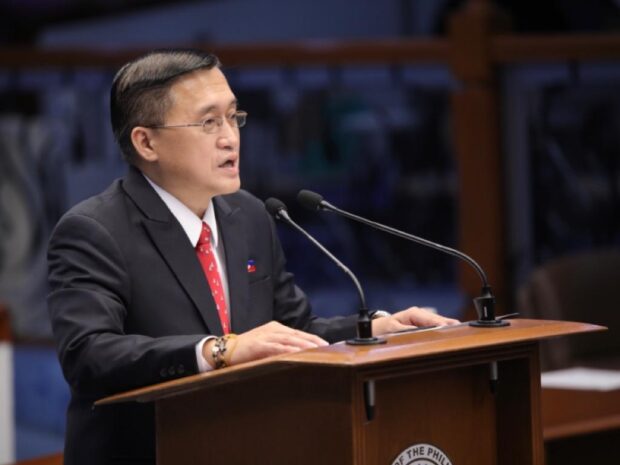
Sen. Bong Go
MANILA, Philippines – Senator Christopher “Bong” Go, a member of the Senate Committee on Agriculture, outlined a two-fold strategy to address the ongoing concerns about rice prices and food security in the country.
“As a member of the Committee on Agriculture, two things ang dapat nating gawin. Unang-una, dapat po ay labanan natin, go against hoarders and smugglers. Dapat po ay walang makinabang na mga smugglers dito,” Go told reporters in an interview on Saturday, October 7, after assisting poor residents in Makato, Aklan.
‘Happy farmers’
Go emphasized the need to focus on providing assistance to farmers to increase agricultural productivity and protect their welfare amid the challenges they face due to rising prices.
“Dapat po masaya po ang ating mga farmers. Dapat po ay kumita ang ating mga farmers,” he said.
He urged the government to improve its interventions for local producers, particularly small farmers.
“Sila po ang dapat suportahan ng gobyerno,” he insisted.
Non-selective aid
Go also asked the Department of Agriculture, as well as other concerned government entities such as the Department of Social Welfare and Development (DSWD), to expedite the distribution of assistance to struggling farmers and qualified indigents especially in rural areas.
“Kung may ayuda po na dapat ibigay, ibigay po sa kanila. May pera naman po ang gobyerno. Wag tayong maging selective,” he said.
“Nandiyan ang programa. Nandiyan ang pondo na aprubado ng Kongreso, siguraduhin dapat ng gobyerno na mapakinabangan ang mga ito ng mga pinakanangangailangang mga kababayan natin tulad ng mga magsasakang naghihirap ngayon,” he stressed.
Go said that this dual strategy aims to strike a balance between market forces and government intervention, focusing on both law enforcement against hoarders and smugglers and uplifting ordinary workers in the agricultural sector.
Citing the crucial role of farmers in ensuring food security, Go has been consistently pushing for stronger agricultural support systems and infrastructure.
Legislative support
He was one of the co-authors of the measure that became Republic Act No. 11901, expanding the agriculture, fisheries, and rural development financing system. He has also been advocating for other programs to support farmers and fisherfolk in the country, such as the enhancement of the irrigation of farmlands and expansion of the National Rice Program.
Go also co-sponsored and co-authored Senate Bill No. 1850–the Senate version of RA 11953, also known as the New Agrarian Emancipation Act. The measure seeks to condone loans that agrarian reform beneficiaries (ARBs) incurred in owning lands under the government’s agrarian reform programs.
The senator also filed SBN 2117 which aims to provide full crop insurance coverage for agrarian reform beneficiaries, as well as SBN 2118 which aims to provide better insurance coverage and services to farmers and help mitigate the impact of natural disasters on the agricultural sector, if enacted into law.
Competitiveness boost
Earlier, Go also emphasized the importance of improving competitiveness and safeguarding local farmers and industries amid the recently ratified Regional Comprehensive Economic Partnership (RCEP) agreement.
Go believes that with open competition as a result of RCEP, the prices of goods should decrease, and ordinary Filipinos, especially the poor and those in the agricultural sector, must benefit from it.
Food production
Go likewise backed proposals to convert idle government lands into agricultural areas to boost food production in the country.
“We must work together to protect our farmers, stabilize prices, and safeguard the welfare of our consumers,” he added.
The lifting of the temporary price ceiling on rice started on October 4, following a recommendation from the Department of Agriculture (DA).
Agriculture Director Gerald Glenn Panganiban cited “positive indicators,” such as decreasing prices in the market and a projected increase in rice supply from local harvests in the last quarter of the year, as reasons for lifting the cap.
President Ferdinand “Bongbong” Marcos, Jr. earlier imposed a maximum price limit for regular milled rice at P41 per kilogram and well-milled rice at P45 per kilogram through Executive Order No. 39.
Rice sellers affected by the price cap received P15,000 as compensation for their financial setbacks. On the other hand, confiscated illegal rice imports were distributed to vulnerable communities.